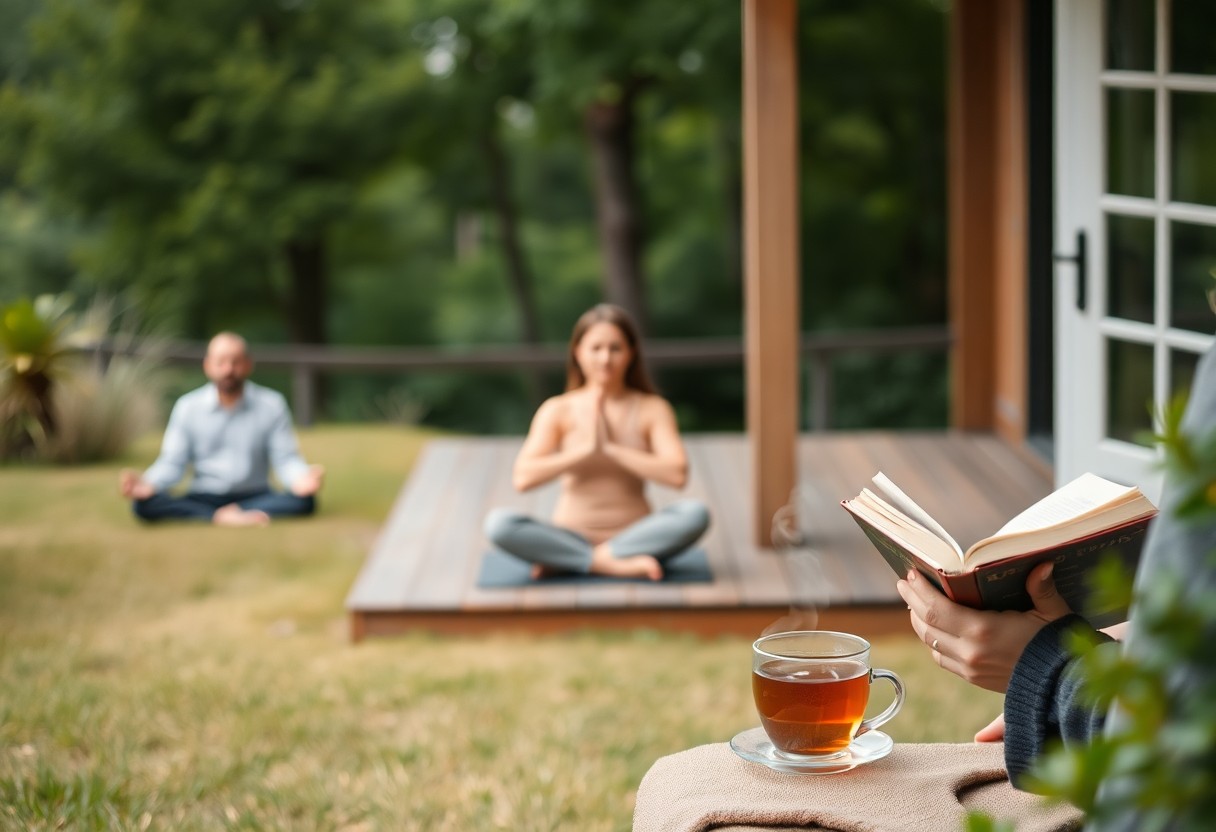
Transform Your Stress With These Positive Thinking Activities
December 3, 2024
Effective Stress Relief Activities For A Happier Mindset
December 5, 2024Many individuals grapple with daily stress, impacting their overall well-being. To help you navigate these challenges, we explore simple stress relief activities that anyone can easily incorporate into their routine. Whether you’re looking for quick fixes or long-term strategies, these activities are designed to enhance your mental and emotional health. By taking just a few moments each day to engage in these practices, you can cultivate a greater sense of peace and improve your quality of life.
Understanding Stress and Its Impact
For many, stress is a common part of life, resulting from various challenges you may encounter daily. Understanding stress and how it affects your well-being is important for managing it effectively. It can manifest in different forms, from mental and emotional strain to physical ailments. The key is recognizing your stress triggers and the toll they take on your life. Doing so can help you develop effective strategies for enhancing your overall well-being.
The Science of Stress
Stress is a natural reaction your body experiences in response to perceived threats or demands. When you encounter stress, your brain triggers the release of hormones, primarily cortisol and adrenaline, preparing your body for a fight-or-flight response. While this reaction can be helpful in short bursts, chronic stress can lead to various health problems. Understanding the science behind stress can empower you to manage it better and implement effective relief strategies.
Effects of Chronic Stress on Health
Health problems arising from chronic stress can be extensive, impacting both your physical and mental well-being. Ongoing stress can lead to anxiety, depression, high blood pressure, and a weakened immune system. It can also exacerbate existing conditions, such as heart disease or digestive issues. The effects of chronic stress may hinder your daily life, affecting your relationships, work performance, and overall happiness.
And chronic stress often creates a vicious cycle, where the psychological and physical effects of stress feed into one another. The longer you experience sustained stress, the more difficult it can become to cope, leading to increased feelings of overwhelm and fatigue. Prioritizing stress relief activities not only alleviates symptoms but also fosters resilience, allowing you to enhance your overall quality of life and well-being.

Mindfulness and Breathing Techniques
Any effort you make to incorporate mindfulness and breathing techniques into your daily routine can significantly reduce stress and enhance your overall well-being. These practices ground you in the present moment, allowing you to cultivate a deeper sense of awareness and relaxation. By focusing on your breath, you can find tranquility and ease the mental clutter that often accompanies daily life.
Deep Breathing Exercises
Among the simplest yet most effective techniques for stress relief are deep breathing exercises. These exercises promote relaxation by allowing you to oxygenate your body and calm your nervous system. By practicing deep breathing, you should feel a wave of relaxation that helps you cope with stressors more effectively.
Mindfulness Meditation Practices
Mindfulness practices elevate your mental clarity and emotional stability through focused attention. By dedicating a few minutes each day to mindfulness meditation, you train your mind to let go of distractions and cultivate a sense of inner peace. This practice can significantly enhance your emotional resilience, helping you navigate daily challenges with a composed mindset.
A dedicated mindfulness meditation practice can transform your relationship with thoughts and feelings. By setting aside time to sit quietly and focus on your breath, you allow yourself to observe your thoughts without judgment. This not only fosters a greater sense of self-awareness but also empowers you to respond to stressors with a calm and centered approach. Consequently, incorporating regular mindfulness meditation into your routine can create a profound shift in your overall mental well-being.
Physical Activities for Stress Relief
There’s a powerful connection between physical activity and stress relief. Engaging in regular exercise releases endorphins, which elevate your mood and improve your overall well-being. By incorporating movement into your daily routine, whether it be brisk walking, cycling, or participating in sports, you can effectively reduce stress levels and cultivate a more positive mindset.
Exercise and its Benefits
Along with endorphins, exercise helps improve your sleep quality, increases your energy levels, and enhances your self-esteem. By dedicating time to physical activities, you equip your body to better handle stressors while promoting a healthier lifestyle.
Yoga and Stretching Exercises
Relief from stress can often be found through yoga and stretching exercises, which combine physical movement with mindfulness. These practices promote relaxation, enhance flexibility, and help clear your mind, making it easier for you to navigate daily challenges.
Stretching not only helps alleviate muscle tension but also encourages a deep connection between your mind and body. By focusing on your breath while you stretch, you invite a sense of calm and presence into your life. Yoga, in particular, emphasizes mindful movement and breathing techniques, allowing you to release stress and cultivate an overall sense of tranquility and balance.
Creative Outlets for Expressing Emotions
Despite the challenges you face, expressing your emotions through creative outlets can significantly enhance your well-being. Engaging in creative activities provides a safe space for you to articulate your feelings, reduce stress, and foster a deeper connection with yourself. Whether through art, music, or writing, tapping into your creative side fosters emotional resilience and promotes mental clarity.
Art and Craft Activities
On your journey to stress relief, art and craft activities can serve as therapeutic tools to express feelings visually. Using materials like paint, clay, or even everyday objects, you can create pieces that reflect your emotional landscape, allowing for valuable self-discovery and relaxation. The process itself is often more important than the final product, so embrace your creativity without judgment.
Writing and Journaling
An excellent way to articulate and process your emotions is through writing and journaling. By putting pen to paper or fingers to keyboard, you can explore your thoughts and feelings in a structured way. This practice not only helps you reflect but also encourages emotional clarity and understanding.
Hence, maintaining a regular writing practice can serve as a powerful tool for emotional expression. Journaling allows you to capture fleeting thoughts, chart your moods, and document personal growth over time. By embracing this habit, you provide yourself with an outlet to release pent-up emotions, leading to greater self-awareness and overall emotional health.
Nature and Outdoor Activities
Now, immersing yourself in nature and engaging in outdoor activities can significantly reduce stress and uplift your spirits. Research shows that spending time outdoors not only allows you to reconnect with your surroundings but also helps clear your mind. Explore 16 Simple Ways to Relieve Stress and Anxiety to discover the transformative effects of nature on well-being.
Benefits of Spending Time Outdoors
With fresh air, sunlight, and natural scenery, outdoor activities can greatly enhance your mood and mental clarity. Nature provides a soothing backdrop that allows you to step away from daily pressures. The combination of physical movement and a calming environment encourages relaxation, reduces anxiety, and improves overall happiness.
Gardening and Nature Walks
The act of gardening or taking leisurely nature walks can serve as wonderful stress relievers. By nurturing plants or exploring trails, you immerse yourself in an activity that promotes mindfulness and encourages physical activity, both of which are imperative for a balanced life.
Benefits of gardening and nature walks extend beyond immediate relaxation. Engaging in these activities can enhance your physical fitness while improving your mood through the release of endorphins. Gardening teaches patience and responsibility, while nature walks help you appreciate the beauty around you, further grounding you in the present moment.
Social Connections and Support
Once again, nurturing social connections can significantly enhance your well-being. Engaging with friends, family, or loved ones provides you emotional support, reduces feelings of isolation, and promotes a sense of belonging. By investing time in these relationships, you can create a strong support network that positively impacts your mental health and overall happiness.
The Importance of Social Interaction
Behind the scenes, social interactions play a vital role in your mental and emotional well-being. Positive relationships can boost your self-esteem, decrease stress, and help you develop healthy coping mechanisms. When you share experiences and connect with others, it fosters a sense of belonging that is necessary for personal development.
Community Engagement Activities
Across various settings, community engagement activities offer excellent opportunities for you to connect with others and enhance your social support systems. Volunteering, joining local clubs or participating in community events can create meaningful interactions that enrich your life while benefiting those around you.
Further, engaging in community activities allows you to meet like-minded individuals who share your interests and values. Not only do these activities foster connections, but they also provide a sense of purpose and accomplishment. Whether it’s helping at a local shelter or participating in a community garden, these experiences can alleviate feelings of loneliness and promote emotional well-being.
To wrap up
So, by incorporating simple stress relief activities into your daily routine, you can significantly enhance your well-being. Whether it’s through mindfulness, physical exercise, or creative expression, finding what resonates with you can lead to lasting positive changes. Prioritizing your mental health is vital, and these strategies are easily accessible for anyone seeking a more balanced life. Dedicate time for yourself and embrace these practices to foster relaxation and rejuvenation in your everyday life.

